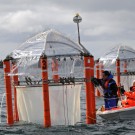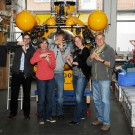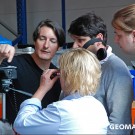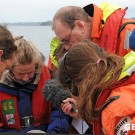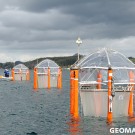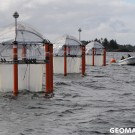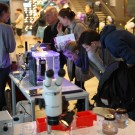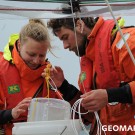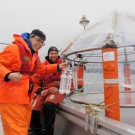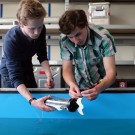21 July 2015 / Bergen, Kiel. In a two-months long experiment in Norway, scientists from GEOMAR Helmholtz Centre for Ocean Research Kiel investigated how ocean acidification affects the plankton community and material fluxes within the marine food web. Their observations confirm that positive and negative effects have to be expected. Among the losers are the […]
Navigators Wochenbericht: Under Pressure
Arbeitsdruck, Zeitdruck, Erfolgsdruck. Was fehlt da noch? Genau – der Wasserdruck. Eigentlich war’s also ziemlich schnell klar, dass wir Ozeanforscher uns am diesjährigen 48-Stunden-Videowettbewerb „Fast Forward Science – Superfast“ von „Wissenschaft im Dialog“ beteiligen mussten. Der stand nicht nur unter dem Motto „Under Pressure“. Wer teilnehmen wollte, war außerdem gefordert, etwas Gelbes zu tragen. Gelb […]
Next stop Hollywood?
“Klimawandelforschung am GEOMAR” – why not aim high in your very first project? “Das Leuchten der Korallen” – let’s start off with something really magic! Dive into the deep ocean with the famous deep-sea crawler “VIATOR”. Or find out what excites marine geologists and what a fun cruise and a scientific cruise have in common […]
Top predators
In KOSMOS science meetings, information about the different levels of the food web are normally presented in succession from the smallest to the largest individuals. Last time, after we had talked about the pico-eucaryotes, phytoplankton, zooplankton, apendicularians and fish larvae, I was asked about the journalists. And I like thinking of them as top predators […]
KOSMOS 2015 presentation at IMR
What’s going on at the Espeland Marine Biological Station? What are these orange constructions in the Raunefjord for? And why do we have to care about ocean acidification? In his Hjort Guest Lecture, Prof. Ulf Riebesell from GEOMAR gives a brief overview of the present state of knowledge about ocean acidification, highlights some deficits in […]
No matter the weather
A fresh northwesterly breeze blew away the rainclouds this morning and made today’s sampling a bit challenging. But everyone returned cheerfully and hungry enough for an early lunch…
Navigators Wochenbericht: Schulklassen besuchen „Future Ocean Dialogue“ auf dem Campusfest der CAU
Erfolgreiche Deutschlandpremiere für „Future Ocean Dialogue“: Nach der Rückkehr der Wanderausstellung im Januar aus Brasilien, wo sie im vergangenen Jahr zu sehen war, und mehreren Wochen intensiver Vorbereitung war es am 22. Mai endlich so weit. Zum 350. Jubiläum der Christian-Albrechts-Universität zu Kiel (CAU) konnten Besucherinnen und Besucher die Exponate im Foyer des Audimax zum […]
Back in the Fjord
“Back in the Fjord”: We discussed the title of our press release at length. Admittedly, we had come up with more appealing titles for previous experiments. But it fits. Oh, yes, it fits! The KOSMOS gang is back at the fjord, this time accompanied by a group of highly motivated students. And how happy everyone […]
Evolution cage match
Microbes reproduce fast. Like, really fast, so that over the course of the mesocosm experiment, some species will go through about 50 generations. And in that time, evolution can happen. Team Evolution (Lisa and Sinead) are measuring how much some of the picoplankton in the mesocosms evolve. To do this, we need to measure the […]
Navigators Wochenbericht: Kleine Forscher und große Kapitäne
Ozeanforschern geht die Arbeit nie aus. Nur ein Beispiel: Wenn wir täglich alle mit Multibeamecholoten ausgestatteten Tiefseedrohnen einsetzen würden, um den Boden des Weltozeans zu vermessen, hätten wir in etwa 150 Jahren eine vollständige, hochaufgelöste Karte der Tiefsee. Selbst wenn die Technik in Zukunft besser wird und die Zahl der Geräte steigt, werden noch Generationen […]
